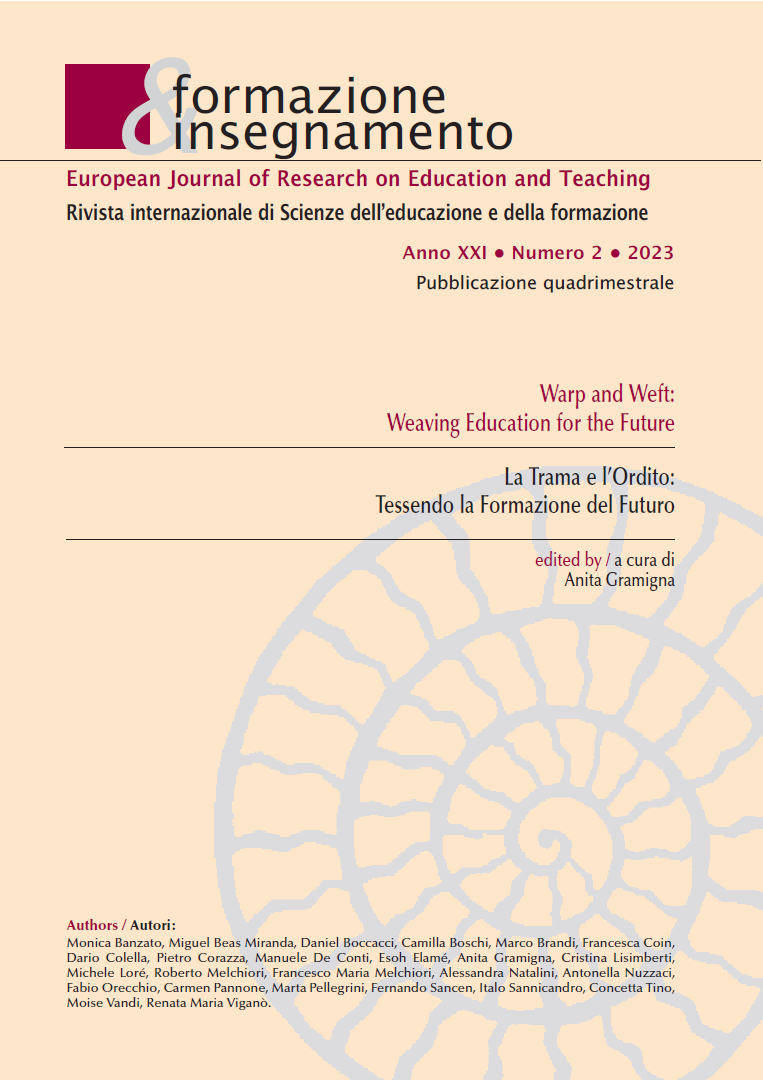Il movimento ecologista Extinction Rebellion: Un contesto che educa alla cura, alla decentralizzazione efficace e all’azione nonviolenta
DOI:
https://doi.org/10.7346/-fei-XXI-02-23_07Parole chiave:
Crisi climatica ed ecologica, Educazione ecologica, Educazione nonviolenta, Pedagogia istituzionale, SociocraziaAbstract
Extinction Rebellion è un movimento ecologista che pratica azioni di disobbedienza civile nonviolenta per spingere i governi ad agire per contrastare la crisi eco-climatica. La tesi sostenuta in questo articolo è che Extinction Rebellion rappresenti un contesto particolarmente interessante dal punto di vista educativo, perché si basa su metodologie organizzative molto strutturate, attraverso le quali i principi fondativi del movimento vengono incarnati in pratiche che i suoi membri tendono ad apprendere e interiorizzare. In particolare, verranno messe in luce tre dimensioni del movimento: in primo luogo si tratta di un ambiente caratterizzato da una forte attenzione alle pratiche di cura personale, interpersonale e comunitaria; in secondo luogo si tratta di un’organizzazione decentralizzata che permette di distribuire le responsabilità ed evitare le concentrazioni di potere, salvaguardando al tempo stesso l’efficacia dei processi decisionali; infine si tratta di un spazio che allena a praticare azioni politiche nonviolente.
Riferimenti bibliografici
Bastianello, F. (2022). ‘Vorrei che tutto questo non fosse necessario’: Responsabilità personale e azioni collettive per la giustizia climatica ed ecologica nel progetto di Ultima Generazione [Master’s Thesis, Università Ca’ Foscari di Venezia]. http://dspace.unive.it/handle/10579/21330
Capitini, A. (1967). Educazione aperta 1. Firenze: La Nuova Italia.
Capitini, A. (1968). Educazione aperta 2. Firenze: La Nuova Italia.
Chenoweth E., & Stephan M. J. (2011). Why Civil Resistance Works: The Strategic Logic of Nonviolent Conflict. New York: Columbia University Press.
Culture Rigenerative. (2021). Cerchi Empatici. Wiki.extinctionrebellion.it. Retrieved August 15, 2023, from https://wiki.extinctionrebellion.it/books/pratiche-e-percorsi-di-cultura-rigenerativa/page/cerchi-empatici
Demozzi, S. (2011). La struttura che connette: Gregory Bateson in educazione. Pisa: Edizioni ETS.
Extinction Rebellion. (2020). Questa non è un’esercitazione: Una guida (L. Fusari & S. Prencipe trans.). Milano: Mondadori. (Original work published 2019)
Extinction Rebellion. (2022). Manuale sul Benessere in Azione (Wiki XR Italia Admin trans.). Extinction Rebellion Italia. Retrieved August 15, 2023, from https://wiki.extinctionrebellion.it/books/benessere-nelle-azioni-bna/page/manuale-sul-benessere-in-azione (Original work published 2019).
Extinction Rebellion Italia. (2023). Cos’è Extinction Rebellion. Extinctionrebellion.it. Retrieved August 15, 2023, from https://extinctionrebellion.it/chi-siamo/extinction-rebellion/
Extinction Rebellion UK. (2023). Resources. Extinctionrebellion.uk. Retrieved August 15, 2023, from https://extinctionrebellion.uk/act-now/resources/
Faure J.-P., & Girardet C. (2017). Empatia. Al cuore della comunicazione non violenta. Firenze: Terra Nuova.
Gandhi, M. K. (1973). Teoria e pratica della non-violenza. Torino: Einaudi.
Hickel, J. (2021). Siamo ancora in tempo! Come una nuova economia può salvare il pianeta. Milano: Il Saggiatore.
IPBES. (2019). Summary for policymakers of the global assessment report on biodiversity and ecosystem services. In IPBES Plenary at its seventh session. Bonn: IPBES. https://doi.org/10.5281/zenodo.3553579
IPCC, Intergovernmental Panel on Climate Change. (2023). Summary for Policymakers. In H. Lee & J. Romero (Eds.), Climate Change 2023: Synthesis Report. A Report of the Intergovernmental Panel on Climate Change. Contribution of Working Groups I, II and III to the Sixth Assessment Report of the Intergovernmental Panel on Climate Change., Geneva: IPCC.
Ito M., & Cross R. (2022). Asset and Action-Based Approaches to Civic Learning: A Review of Frameworks, Evidence and Approaches. Irvine, CA: Connected Learning Alliance. Retrieved August 15, 2023, from https://clalliance.org/publications/asset-and-action-based-approaches-to-civiclearning-a-review-of-frameworks-evidence-and-approaches
King, M. L. (2016). Perché non possiamo aspettare. Prato: Piano B. (Original Work published 1964)
Klein, N. (2015). This Changes Everything: Capitalism vs. The Climate. New York: Simon & Schuster.
Latour, B. (2019). Essere di questa terra: Guerra e pace al tempo dei conflitti ecologici. Torino: Rosenberg & Sellier.
Macy, J. (2014). Coming back to life: The updated guide to the Work that Reconnects. Gabriola Island: New Society.
Miller, T. (2017). Storming the Wall: Climate Change, Migration, and Homeland Security. San Francisco: City Lights.
Mulvey K., & Shulman S. (2015). The Climate Deception Dossiers. Internal Fossil Fuel Industry Memos Reveal Decades of Corporate Disinformation. Cambridge (MA): Union of Concerned Scientist. Retrieved August 15, 2023, from https://www.ucsusa.org/sites/default/files/attach/2015/07/The-Climate-Deception-Dossiers.pdf
Rau, T. J., Koch-Gonzalez, J. (2018). Many Voices One Song: Shared Power with Sociocracy. Amherst (MA): Institute for Peaceable Communities.
Rosenberg, M. B. (2017). Le parole sono finestre (oppure muri): Introduzione alla comunicazione nonviolenta. Reggio Emilia: Esserci.
Seeds for Change (2013). A Consensus Handbook. Seeds for Change: Strengthening Co-Operation, Empowering Resistance. Lancaster: Seeds for change. Retrieved August 15, 2023, from https://www.seedsforchange.org.uk/handbookweb.pdf
Seeds for Change. (2020). Facilitation tools for meetings and workshops. Seeds for Change: Strengthening Co-Operation, Empowering Resistance (4th ed.). Lancaster: Seeds for change. Retrieved August 15, 2023, from https://www.seedsforchange.org.uk/tools
Servigne, P., Stevens, R., & Brown, A. (2020). How everything can collapse: A manual for our times. Polity.
Supran, G., Rahmstorf, S., & Oreskes, N. (2023). Assessing ExxonMobil’s global warming projections. Science, 379(6628), eabk0063. https://doi.org/10.1126/science.abk0063
Thomask. (2021). Sistemi auto-organizzati: Principi e pratiche di auto-organizzazione in XR (Gruppo SAO Ed.). Wiki.extinctionrebellion.it. Retrieved August 15, 2023, from https://wiki.extinctionrebellion.it/books/sistemi-auto-organizzanti
Tolomelli, A. (2015). L’empowerment come paradigma della formazione. Bergamo: Junior.
Turner, J. M. (2014). Counting Carbon: The Politics of Carbon Footprints and Climate Governance from the Individual to the Global. Global Environmental Politics, 14(1), 59–78. https://doi.org/10.1162/GLEP_a_00214
Vasquez, A., & Oury, F. (1975). L’educazione nel gruppo classe: La pedagogia istituzionale. Bologna: EDB.
Vasquez, A., & Oury, F. (1977). Tecniche e istituzioni della classe cooperativa. Milano: Emme.
Washington, H. A. (2019). A Terrible Thing to Waste: Environmental Racism and Its Assault on the American Mind. Boston: Little, Brown Spark.
##submission.downloads##
Pubblicato
Come citare
Fascicolo
Sezione
Licenza
Copyright (c) 2023 Pietro Corazza

TQuesto lavoro è fornito con la licenza Creative Commons Attribuzione 4.0 Internazionale.
Formazione & insegnamento è distribuita con la seguente licenza: Attribution 4.0 International (CC BY 4.0).
Per ulteriori dettagli, si rimanda alle Politiche di archiviazione e ai Termini di Copyright e Licenza.





